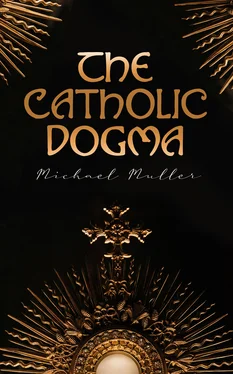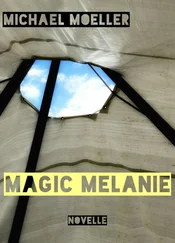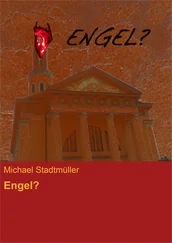Michael Muller
Religious Treaties (Extra Ecclesiam Nullus Omnino Salvatur)
e-artnow, 2021
Contact: info@e-artnow.org
EAN: 4066338129680
Preface. PREFACE. Table of Contents
Chapter I.
Chapter II. The Infallible and Only True Guide to Heaven
Chapter III.
Chapter IV. Bishop Coxe's Dishonesty.
Chapter V. Introduction: Refutation of the False Assertions of Reverends S. O. Cronin and Young.
Chapter V. Part I. There is No Salvation Out of the Roman Catholic Church for those who die without being united to her.
Chapter V. Part II. Of Those Heretics who are not guilty of the sin of Heresy.
Table of Contents
Necessary to be Read.
[every dogma admits of no interpretation contrary to that which it has received from the beginning.]
St. Paul, in his epistle to St. Timothy, exclaims: "O Timothy, keep that which is committed to thy trust, avoiding the profane novelties of words, and oppositions of knowledge falsely so called." (l. Tim. vi. 20.)
"Who is at present this Timothy?" asks Vincent of Lerins, and he answers: It is the Body of the Pastors of the Church, and therefore every Pastor must apply these words of St. Paul to himself: O Timothy, O Pastor, O Doctor, O Priest, " Keep that which is committed to thy trust," pure and undefiled, "earnestly contend for the faith once delivered to the saints; " (Jude, v. 3); never depart from the sacred words of God, "once put into thy mouth." (Isai. lix. 21.) "You, therefore," says Bishop Hay, "must never know what it is to temporize in religion, in order to please men, nor to adulterate even one iota of the Gospel of Christ to humor them. You must declare the sacred truths revealed by Jesus Christ in their original simplicity, without seeking to adorn them with the persuasive words of human wisdom, much less disguise them in a garb not their own. Truth, plain and unadorned, is the only weapon you must employ against your adversaries, regardless of their censure or their approbation. ‘This is the truth,’ you must say, ‘revealed by God; this you must embrace, or you can have no part with him.’ If the world looks upon what you say as foolishness, you must not be surprised, for you know that ‘the sensual man perceiveth not the things that are of the spirit of God; for it is foolishness to him, and he cannot understand’ (I. Cor. ii. 14.) ; ‘but that the foolishness of God is wiser than men;’ and pitying this blindness you must earnestly pray to God to enlighten them, ‘with modesty admonishing them … if, peradventure, God may give them repentance to know the truth.’ (II. Tim. ii. 25.)
"If there ever was a time when it was especially necessary for every Pastor of the Church to watch over the purity of faith and morals which the Church has entrusted to him, it is the present age and country, in which so many condescensions and compliances are admitted and received at the expense of the purity of Catholic faith and morals, and the narrow way that leads to life is converted, in the opinion of men, to the broad road that leads to destruction.
"This remark applies especially to that latitudinarian principle so common now-a-days, that a man may be saved in any religion, provided he lives a good moral life, according to the light he has ; for, by this, the faith of Christ is evacuated, and the Gospel rendered of no avail; a Jew, a Turk, a Heathen, are all comprehended in this scheme, and if they live a good moral life have as good a right to salvation as a Christian!
"To be a member of the Church of Christ is no longer necessary, since, if we lead a good moral life, we are in the state of salvation, whether we belong to her or not! What a wide field does this give to the passions of men! What liberty to all the whims of the human mind! It is therefore of the utmost consequence to state and to show plainly the revealed Catholic truth that ‘ there is no salvation out of the Catholic Church .'"
It must be remembered that every Catholic dogma is a revealed truth that has always been held by the Fathers of the Church from the beginning and must, therefore, be interpreted, not according to modern opinions and latitudinarian principles, but according to the faith of the Fathers and Doctors of the Church; and therefore Vincent of Lerins says: "A true Catholic is he who loves the truth revealed by God, who loves the Church, the Body of Christ, who esteems religion, the Catholic faith, higher than any human authority, talents, eloquence, and philosophy; all this he holds in contempt, and remains firm and unshaken in the faith which, he knows, has always from the beginning been held by the Catholic Church; and if he notices that any one, no, matter who he may be, interprets a dogma in a manner different from that of the Fathers of the Church, he understands that God permits such an interpretation to be made, not for the good of religion, but as a temptation, according to the words of St. Paul: ‘For there must be also heresies; that they also, who are reproved, may be made manifest among you.’ (I Cor. xi. 19) ‘And indeed, no sooner are novel opinions proclaimed, than it becomes manifest what kind of a Catholic a man is:’ (Commonit.) Hence, as St. Augustine says, ‘a theologian who is humble, will never teach anything as true Catholic doctrine, unless he is perfectly certain of the truth which he asserts, and proves it from Holy Scripture and the Tradition of the Church.’ Those who have learned theology well,’ says St. Basil, will not allow one iota of Catholic dogmas to be betrayed. They will, if necessary, willingly undergo any kind of death in their defence.’
"They will propose each dogma, especially the all-important dogma, " out of the Church there is No salvation ," in the words of the Church and explain it as she understands it; they are most careful not to weaken in the least the meaning of this great dogma, by the way of proposing or explaining it. Why does not St. Paul say: if any one preach to you a Gospel contrary to that instead of beside that which. we have preached to you? ‘It is,’ says St. John Chrysostom, ‘to show us that one is accursed who even indirectly weakens the least truth of the Gospel.’ (Cornelius a Lapide in Epist. ad Gal. I. 8)"
"As there is," says Pius IX., "but one God the Father, one Christ his Son, one Holy Ghost, so there is also only one divinely revealed truth, only one divine faith - the beginning of man's salvation and the foundation of all justification, by which (faith) the just man lives, and without which it is impossible to please God and to be admitted to the Communion of his children; and there is but one true, holy, Catholic, Roman Church and divine teaching Authority, (cathedra) founded upon Peter by the living voice of the Lord, out of which (Church) there is neither the TRUE FAITH nor ETERNAL SALVATION, since no one, can have God for his Father, who has not the Church for his Mother." (Encycl. Letter, March 17, 1856.)
"The Holy Ghost," says St. Augustine, "is to the Body of Christ, which is the Church, what the human soul is to the human body. It is by the soul that each member of the body lives and acts. In like manner, it is by the Holy Ghost that the just man lives and acts. As the soul does not follow a member which is cut off from the body, so, in like manner, does the Holy Ghost not follow a member which has been justly cut off from the Body of Christ. He, therefore, who wishes to obtain life everlasting, must remain vivified by the Holy Ghost; and in order to remain vivified by the Holy Ghost we must keep charity, love the truth, and desire unity." (Serm. 267.) "Therefore no one can find life everlasting except in the Catholic Church." (Serm. ad Caesarenses) "Where unity is wanting, there can be no divine charity. Hence it is that divine charity can be kept only in the Catholic Church." (Contr. lit. Petil., lib. ii., cap. 77.) Now, as no one can obtain salvation without having the spirit of Christ, or divine charity, and as this spirit or divine virtue, which is called the soul of the Church, is kept only in the unity of the Church, it is evident that out of the Church there is positively no salvation.
Читать дальше












